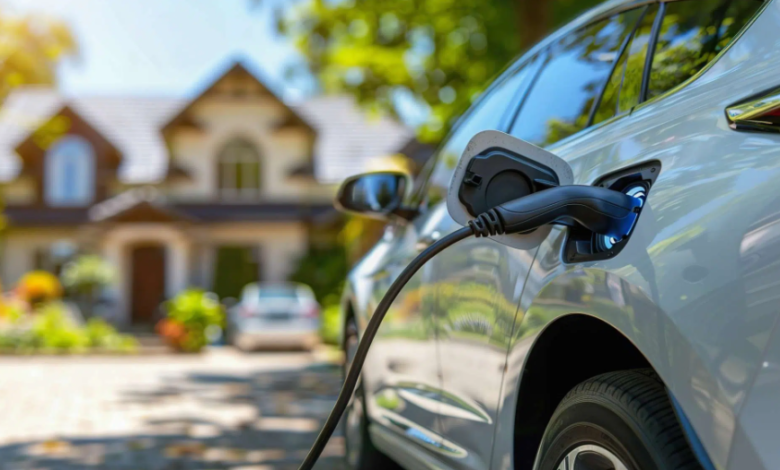Benefits of a Home Charging Station

As the popularity of electric vehicles (EVs) continues to surge, more drivers are considering the advantages of installing a home charging station. According to the International Energy Agency (IEA), EV sales exceeded 14 million globally in 2023, a 35% increase from the previous year. With more EVs on the road, the need for convenient and cost-effective charging solutions has never been greater.
While public charging stations are expanding, many EV owners quickly realize the convenience and savings that come with charging at home. In this article, we’ll explore the key benefits of having your own home charging station and why it’s an investment worth considering.
1. Unmatched Convenience
One of the biggest advantages of a home charging station is convenience. Instead of driving around to find a public charger, you can plug in your vehicle overnight and wake up to a full battery every morning.
- Time savings: The average U.S. driver spends about 16 minutes per trip to find and use a public charger. With a home setup, that hassle disappears.
- Flexible charging: You decide when to charge—whether that’s during off-peak hours for cheaper rates or while your car sits idle at night.
2. Faster Charging Speeds
Charging an EV through a standard household outlet (Level 1) can be slow, providing only 3–5 miles of range per hour. In contrast, a Level 2 home charging station offers 20–30 miles of range per hour, making it significantly faster and more practical for daily use.
For example, if your EV has a 60-kWh battery, a Level 1 charger might take more than 24 hours to fully recharge, while a Level 2 charger can do the job in 6–8 hours. This means you can charge overnight without worrying about running out of power the next day.
3. Long-Term Cost Savings
While installing a home charging station requires an upfront investment, the long-term savings are substantial:
- Lower charging costs: Home electricity rates are typically 40–60% cheaper than public fast-charging stations.
- Utility incentives: Many utility companies offer rebates or reduced rates for EV owners who install home chargers. In 2023, over 35 U.S. states provided some form of incentive for EV charging installations.
- Reduced wear and tear: Regularly using a home charger instead of high-powered DC fast chargers can extend your EV battery’s lifespan, saving on costly replacements.
4. Increases Property Value
With EV ownership on the rise, homes equipped with a home charging station are becoming more attractive to buyers. A 2022 study by Redfin revealed that homes with EV-friendly features sold for up to 2.6% more on average than similar homes without them.
For potential buyers who already own or are considering an EV, a built-in charging solution adds convenience and appeal, giving your property an edge in the real estate market.
5. Environmental Impact
Switching to an EV already reduces your carbon footprint compared to gas-powered cars. Pairing it with a home charging station amplifies the impact:
- Charging at home encourages the use of renewable energy sources like rooftop solar panels.
- Many EV owners schedule charging during hours when grid demand is lower, which reduces reliance on fossil fuel power plants.
- In 2022, U.S. households with EVs and home charging reported saving an estimated 1.5 metric tons of CO2 per year compared to those relying on public charging.
See also: Safety and Technique of Eyebrow Tattoo Removal in Dubai
6. Safety and Reliability
Public charging stations can sometimes be out of service, overcrowded, or located in inconvenient areas. A home charging station provides reliability and peace of mind:
- Always available: No waiting in line or dealing with broken chargers.
- Built-in safety features: Most home chargers include safeguards like ground fault protection, surge protection, and automatic shutoff to prevent overcharging.
- Weatherproof options: Outdoor units are designed to withstand rain, snow, and extreme temperatures.
7. Smarter Charging with Technology
Many modern home charging stations come equipped with smart features that make charging more efficient:
- Wi-Fi connectivity for remote monitoring.
- Mobile apps to schedule charging during off-peak hours.
- Energy usage reports to track costs and efficiency.
- Integration with solar systems or smart home devices for eco-friendly living.
For instance, studies show that using time-of-use scheduling can reduce EV charging costs by up to 25% annually.
8. A Future-Proof Investment
As EV adoption accelerates, investing in a home charging station ensures that your home is ready for the future of transportation. Many manufacturers now produce vehicles with larger battery capacities, and having a Level 2 charger at home ensures compatibility with current and future EV models.
Plus, with government commitments to phase out internal combustion vehicles by 2035 in several countries, the demand for home charging will only continue to grow.
Final Thoughts
Installing a home charging station is more than a convenience—it’s a smart financial, environmental, and lifestyle decision. From faster charging times to long-term savings and increased property value, the benefits make it a worthwhile investment for any EV owner. For residents looking to further reduce energy expenses, comparing providers to find the most competitive options—such as those offering the lowest port mansfield electricity rates, can make home charging even more cost-efficient.
As the EV revolution continues, having reliable charging at home isn’t just a luxury—it’s becoming a necessity. By making the switch now, you’ll enjoy greater independence, lower costs, and the satisfaction of driving into a greener future.




